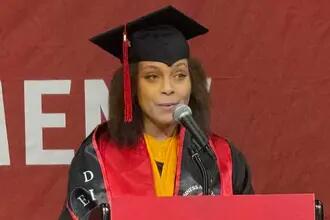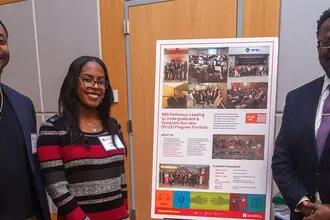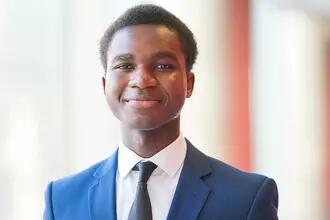
Dana Bochna, a former RBS employee, with new alumni Robneek Singh and Dea Dibna.
Alumni share career advice at Rutgers-Newark scholars workshop
This story was originally published on the School of Arts and Sciences-Newark website. It was written by Nora Luongo.
On November 20, the Rutgers-Newark Scholars Workshops Program held its seventh, and first-ever virtual, workshop for student scholarship recipients, featuring a discussion on remote job search and career advice by three Rutgers-Newark alumni.
The Scholars Workshops program started in 2017 to better engage with scholarship students at Rutgers-Newark. “Private scholarships, like the ones you have,” said Nancy Masterson-Newkirk during the session, “make a huge difference for Rutgers University-Newark students. They are funded by alumni, parents, staff, and faculty, many of whom were once Rutgers-Newark students.”
Masterson-Newkirk, who is donor relations and stewardship officer at Rutgers-Newark, and who organizes the event every semester, said: “We wanted to connect with scholarship students, get to know them, and celebrate the power of philanthropy.”
The workshops are held every fall and spring to give students a chance to learn about private philanthropy and the generosity of Rutgers donors. It also gives them an opportunity to express their gratitude directly to the donors. Normally, the workshops are held at Shine Portrait Studio in Express Newark and include the opportunity for students to receive professional headshots they can use for their LinkedIn and other profiles, but this year, the team had to think creatively about what they could offer scholars virtually.
During the workshop, Dana Bochna, SASN ‘08, SPAA ‘19, Robneek Singh, RBS ‘19, Honors College and Braven Fellow, and Dea Dibna, RBS ‘19, who all currently work at Prudential Financial, shared advice and answered questions about searching for a job and working remotely. Bochna, who is a senior partner for Early Talent Acquisition, shared her unique perspective as a recruiter for undergraduates and graduate students. She stressed that even though interviews and recruiting are currently remote, applicants can still use the same tips, tricks, and preparation that they would do in person. She also advised attendees to seek out fellow Rutgers alumni in positions similar to ones they’d like to pursue. “You have an incredible alumni network to lean into.”
Dibna agreed, adding that being intentional is key. “It’s really important to know what you want out of that conversation. Think about questions, about what exactly this person has to offer that you want to learn more about.”
Robneek shared that his strategy included networking as a student. He explained that he joined several different student organizations his freshman year. “I chose these different types of organizations because I wanted to gain exposure to different students across the campus. All these different opportunities allowed me to meet different people that I wouldn’t have otherwise met if I had just gone to classes and then straight home.”
Questions from the attendees ranged from how to stand out in an interview, how to stay motivated, to the panelists’ best career advice.
Dibna suggested that before an interview, applicants think about their own experiences and which ones might help illustrate different soft skills such as problem-solving. “You can say ‘I collaborate well with others,’ but giving an example of how you’ve done this will show recruiters that you’ve thought this through and it isn’t just something you’re blurting out.”
Bochna echoed that these soft skills and leadership skills are increasingly important, especially when just starting out, but also when trying to move into a new role or job sector. “If you’re looking to transition, do your homework. It’s all about your experiences, and how you can apply them to a new area.”
She added that they were beginning to see more skills-based resumes in her role as a recruiter, and that it’s a good option for someone transitioning to a new role or thinking about a different career. “Adaptability, agility, your leadership ability, are so much more important than a specific hard skill.”
The trio agreed on the importance of setting specific goals throughout your career. “Think about the impact you want to make in the role and what you want to learn from it,” said Dibna.
Robneek said he finds writing goals down keeps him more accountable, adding that sharing aspirations with others also keeps him on track.
When asked about staying motivated in their day-to-day, Dibna said her motivation was knowing the impact her job was making on the company. “If you understand that, you’ll do the work and you can motivate your team members.”
Robeek emphasized the importance of open lines of communication with the team, especially when working remotely. He added that keeping to a very strict schedule and separating his work space from his personal space helps him stay on track and not overwork. “The schedule brings a bit of normality.”
“Take that time [off].” said Bochna. “Take the vacation even if it’s a staycation. It will keep you happier and more motivated and you’ll have better output.”
Bochna ended the session by sharing advice from one of her colleagues at Prudential. When deciding whether a job or opportunity is the right next step for you, look for something that follows the one-third rule, she said. “If it’s the right next move, one-third of the job you’ll know, one-third of the job you can learn, and the other one-third scares the heck out of you.”
“It’s okay if it’s scary. It’s okay if you’re uncomfortable. That might be the best move you ever take.”
Press: For all media inquiries see our Media Kit


